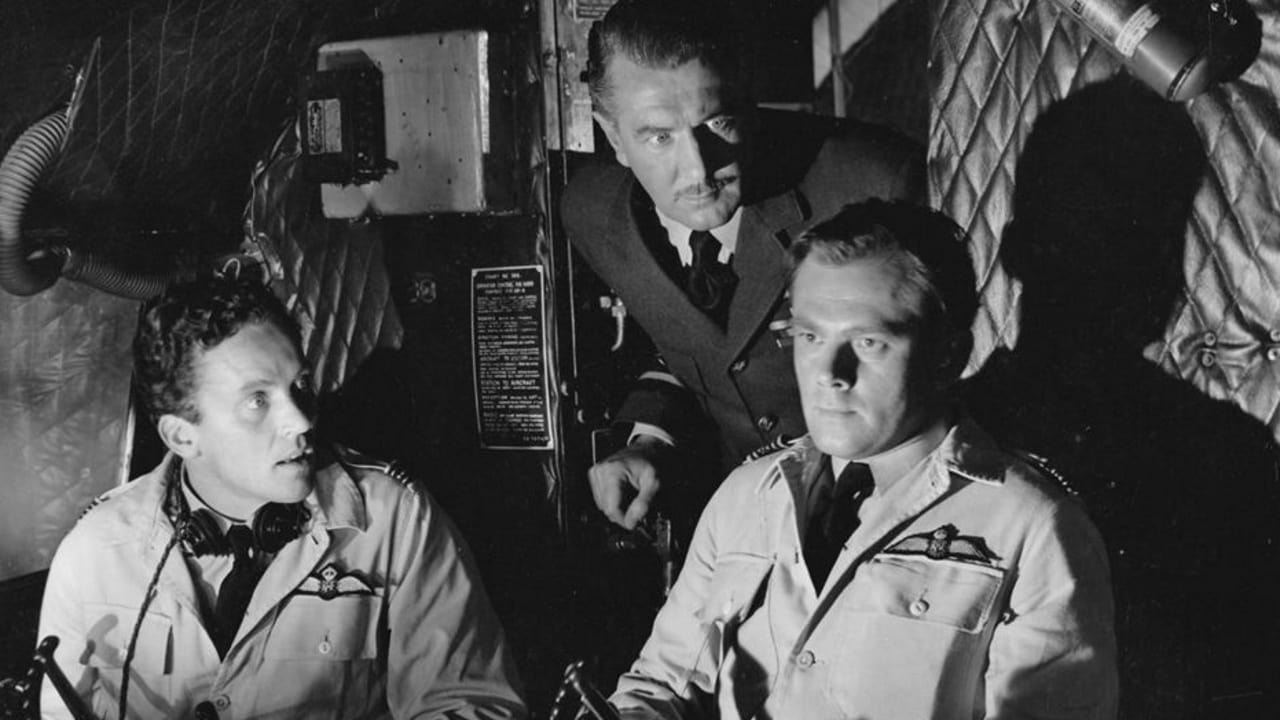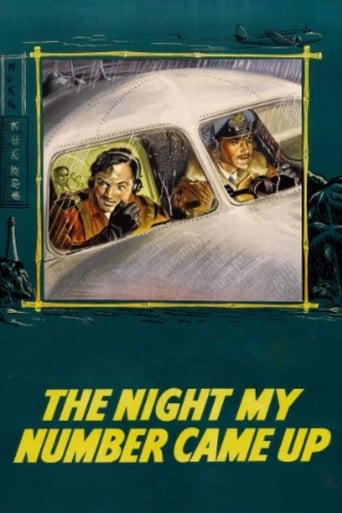

recommended
... View MoreLack of good storyline.
... View MoreInstant Favorite.
... View MoreOne of the best movies of the year! Incredible from the beginning to the end.
... View MoreThis film has been undeservedly overshadowed by that other classic British film on the supernatural 'Dead of Night'.Efficiently directed by Leslie Norman, who gets good performances out of all the actors, it is that best of supernatural films, a film about ideas and characters caught up in an increasingly mysterious, ominous and threatening situation rather than a conventional ghost or horror story, or collection of such stories as in Dead of Night'. The scripting is excellent, as it should be from the pen of RC Sheriff who wrote the classic WWI story Journey's End. It is fascinating to learn that the inspiration for the film was an actual premonition recounted by a senior RAF officer Victor Goddard.The true film about the supernatural is my view a film not so much about ghosts or demons but about ideas and philosophical concepts as the characters find themselves locked into a supernatural drama of Fate over which they realise with mounting unease, even fear they have no control. That a dream which was recounted at a party with which they all become familiar - the gradual revelation to each of them is nicely paced - may be presaging the fatal air crash in which they may all perish.Most of the characters are the British at their most famously pragmatic; the Air Marshal (stolidly played by Michael Redgrave, for the most part, but who himself gives a marvellous suggestion of barely controlled hysteria towards the end of the film as he tries to order the captain of the doomed flight to go against the latter's better judgement as to how to handle a crash landing), the pilots, the young lady secretary, the aide to the Air Marshal (played by Denholm Elliott in a nicely judged performance subtly suggesting how his character, as a former Battle of Britain pilot, is suffering from what later would be called post-traumatic stress disorder). Underneath, however, you sense in each of them a backstory in which given sufficient prodding by fate as occurs in this story their characters would inevitably begin to betray doubts as whether to the world which they usually inhabit is quite as they would like to believe. That the British stiff upper lip and lack of imagination has its limits. There is a marvellous saying by the British scientist J.B.S. Haldane I would like to quote here. "I have a suspicion that the world is not only stranger than we conceive but stranger than we can conceive." Alexander Knox is particularly effective as the outwardly rational Civil Servant who is repressing inner demons, possibly created or exacerbated by his time as a POW, which increasingly cause him to feel, as the dream unfolds, that he is hardly in control of his own life. Michael Hordern is excellent value as the dreamer of the dream whose recounting of which at the party, sets the whole plot in motion. Hordern manages to slyly suggest something supernatural about his character, even though he is an officer in the British Navy, something of what they call in mythology 'the trickster spirit'.
... View MoreAll the reviewers recognise this as great story telling with lots of snippets all over the place to add interest: the framing of the story between Michael Hordern's first arrival at air traffic control, and his chilling final remarks to the controller; Denholm Elliott's background as the Battle of Britain ace who cracked, Alexander Knox's unpleasant internment in Hong Kong during the war, the jokes about officers and civilians between the squaddies, Alfie Bass and Bill Kerr (Hancock's famous sidekick).But a practical reason to keep coming back to this film is the early shot of making the approach to Kai Tak (once the world's greatest real-life white knuckle ride) in the days before the surrounding hills were covered with high rise apartments which you looked up to as you banked to starboard on finals.
... View MoreLeslie Halliwell in his book HALLIWELL'S HARVEST refers to this as a "smoking room story", which is the kind of reminiscence tale told between old friends in a club over drinks. It is not given in one shot - all good anecdotes are told slowly and build up. This one (apparently based on a true incident from the Far East in the late 1940s) takes it's time, but as it progresses the momentum of events squeeze and squeeze the human personnel involved until the moment of crisis.Do you believe in fate? It is an issue that has perplexed man since we first began to reason. Are our destinies written out in the stars of astrology, or in the hands of the three Greek "Fates" who spin, measure, and cut our threads? Or is everything done by chance, pure and simple? Years ago I read a portion of an essay by William James (I think it was him) for a philosophy course. James dismissed fate - he felt that the problem with believing in it is that if you decide to go down street A to reach point D a fatalist will say that you were always supposed to do that. But if you go down Street B to reach point D the fatalist would say the same thing, and that didn't sit well with James. But a fatalist would probably point out that as you went on that occasion only by one of those routes, that is the destined route you had to take at that occasion. So who can really know? In THE NIGHT MY NUMBER CAME UP, Michael Redgrave is a British Air Marshall who must go on a mission with several others, including Denholm Elliot and Alexander Knox in one of the military Dakotas used in World War II. There would be nothing wrong about this, but Michael Hordern who is in charge of arranging the trip has just had a nightmare wherein Redgrave, Elliot, Knox, and several others are traveling to the location of this mission (which Hordern did not know about when he went to bed that night) in a Dakota that is in mechanical difficulties and in very bad weather. In fact, it is crashing on a beach.Hordern makes the mistake of telling this to the three of them, and while Redgrave pooh-poohs it, Elliot and Knox are not as certain (although Knox pretends it is all nonsense). Among other things, a major political figure (Ralph Truman) is supposed to be on the plane too in the dream, and he is not scheduled to attend the mission that Redgrave is going on. So the preparations go ahead. But point by point, little things from the dream begin to fall into place in the real world. For example, at a stopover, Truman suddenly shows up - he has to go by the Dakota on a separate trip, hooking up to another flight later on. Also there are a certain number of passengers, including a noisy one, who are to be on the plane. Everyone is happy when the number of passengers goes down, but it goes up as well. Then a rather noisy, boisterous businessman (George Rose, naturally), comes on board - literally manipulating his way on board when initially kept off by Elliot and Knox (he circumvents them going to Redgrave and Truman).So the circumstances grow in the small world of that pressurized cabin as the passengers watch amazed at how good weather collapses and engine problems multiply (they can't raise the plane above a certain level outside the storm due to a pressurization problem - ironically enough). But Redgrave maintains his icy calm throughout the situation - he is determined that he and the others are not going to give into panic over the paranormal.The film is excellent in tackling this type of situation in a serious way. In the end it does not matter if you are a fatalist or not, the film will carry you to to it's conclusion successfully.One final minor point. I don't know much about the scrap metal business, but this film (made in 1955) and the Judy Holliday movie BORN YESTERDAY (1950) and one classic sequence in THE BEST YEARS OF OUR LIVES (1946) with Dana Andrews and the scrapped fleet of bombers are the only ones that seem to tackle this growing big business. A lot of military hardware was there for the taking after 1945. In BORN YESTERDAY, Harry (Broderick Crawford) owns junk yards and has built a local empire on scrap metal (and is in Washington to try to get the laws altered to expand his business). Here, George Rose (an English counterpart to Harry) is trying to get on the flight in order to get to Japan for an important conference dealing with British scrap metal interests in the Far East (and he constantly mentions the American competition as intense - a nod to Crawford?). It's almost enough to start a college study into the post war scrap metal business!
... View MoreI originally saw this great film not long after it was released in 1955. I remember sitting on the edge of my seat waiting for the climax to come and make the prophecy come true. When the climax came I remember heaving a huge sigh of relief, so great was the tension created by the cast and directors. This is the type of film that 'sneaks up on you' because it was not released here as the main attraction (In the days when a black and white film was shown first and I thought it was far better than the film I had gone to see. I have seen it only once since then and it captured my attention just as much then. I wish a film company or TV channel would release it. I would dearly like to obtain a video copy of it as this seems to be the only way I'll ever get to see it again. Ron Sawers
... View More